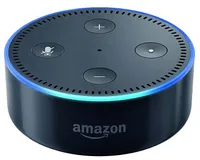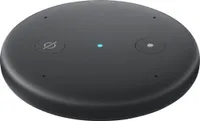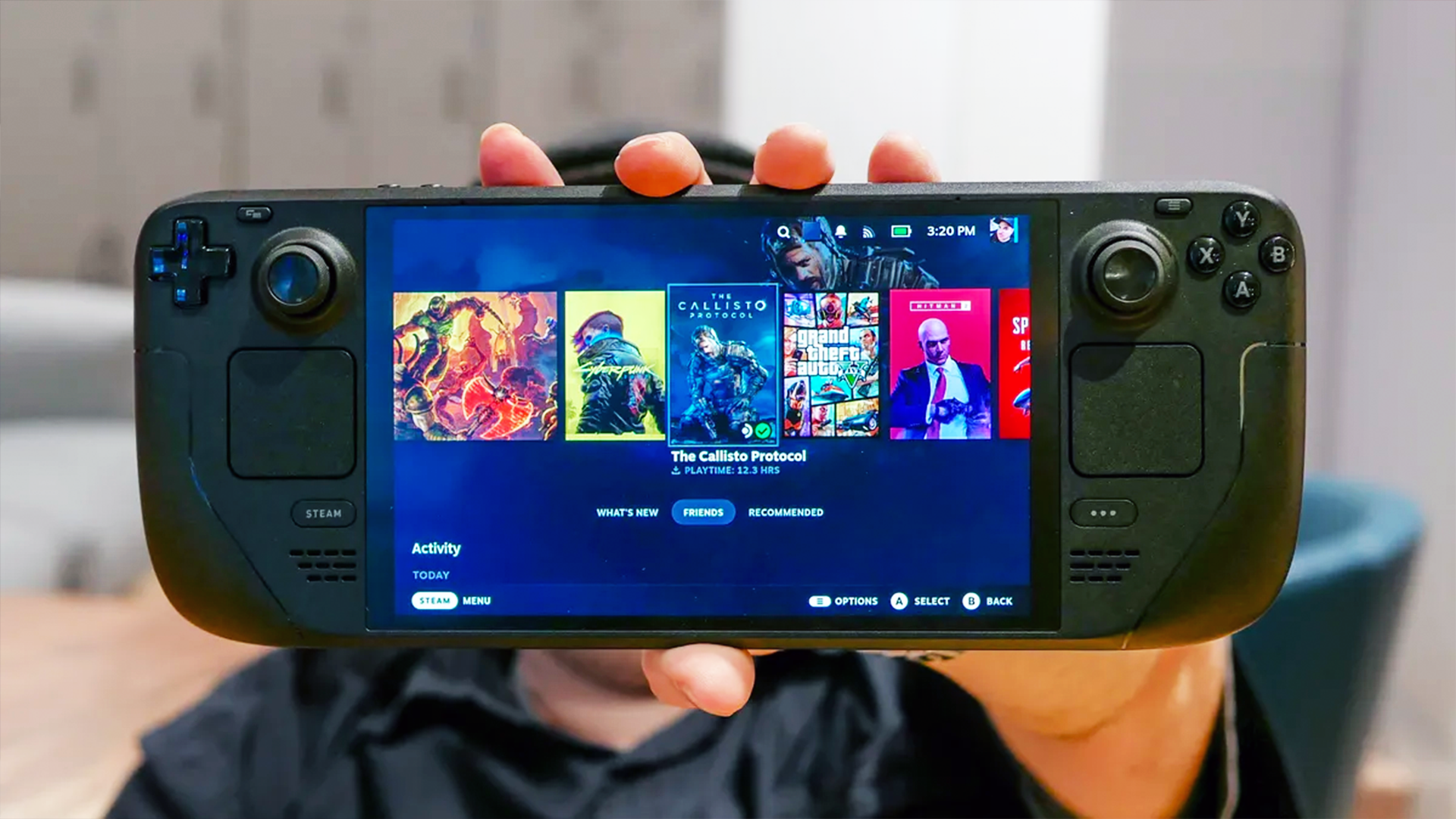Google Home Mini vs. Echo Dot: Which Cheap Smart Speaker Wins?
The Google Home Mini has some advantages over the Echo Dot, especially in sound quality, but Amazon's little smart speaker is simply more versatile.
With the launch of the Google Home Mini, there are now two sub-$50 smart speakers competing for dominance in your living room, bedroom and elsewhere around your house. But how does the Mini compare to the Amazon Echo? We put them through a seven-round matchup to find out which is the best budget speaker.
Design
With its hockey-puck-like shape, the Echo Dot is a chief example of function over form. Nothing stands out about its design, but this speaker is a cinch to use. Four buttons on top let you control the volume, turn the mic on and off, and activate Alexa. A ring of LEDs around the top edge makes it easy to see when Amazon's voice assistant is listening.
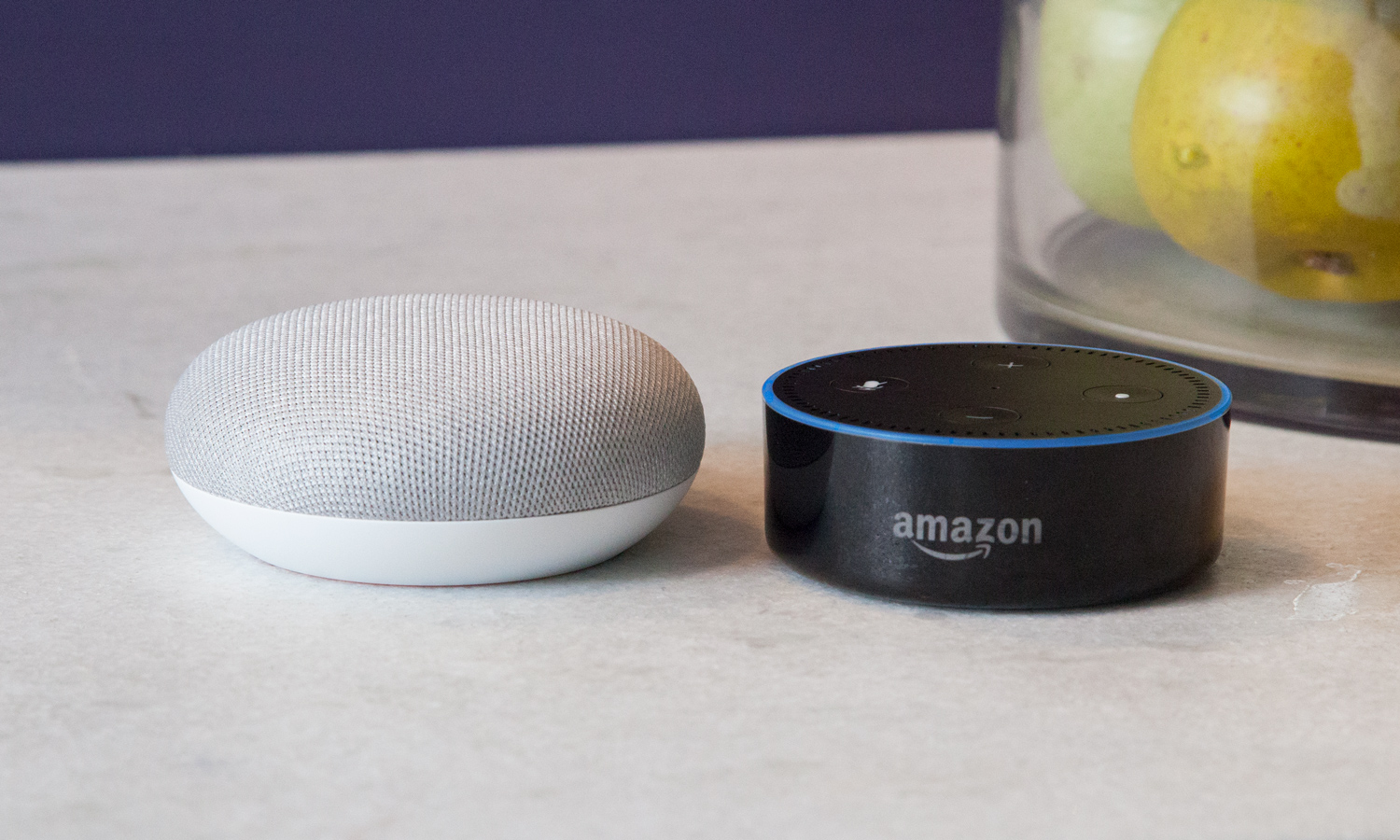
The cloth-covered, pebble-like Home Mini is aesthetically more pleasing, but not as intuitive to use. Instead of physical volume buttons, for instance, you merely have to tap either side of the device. That's cool, but it's not obvious unless you read the manual. Four LEDs on the top of the Home Mini indicate its status and when the assistant is listening, but you can't see these lights from across the room. Originally, you could tap the top of the Home Mini to activate the Assistant, but Google has disabled that functionality due to malfunctioning units.
Winner: Echo Dot. While it doesn't look as nice as the Home Mini, it's easier to use.
Audio Quality
Both the Echo Dot and the Home Mini have a single speaker, but Google put much more thought into its speaker's audio capabilities than did Amazon. When I listened to the same tracks on both devices, the Dot produced thin, reedy vocals with almost no bass.
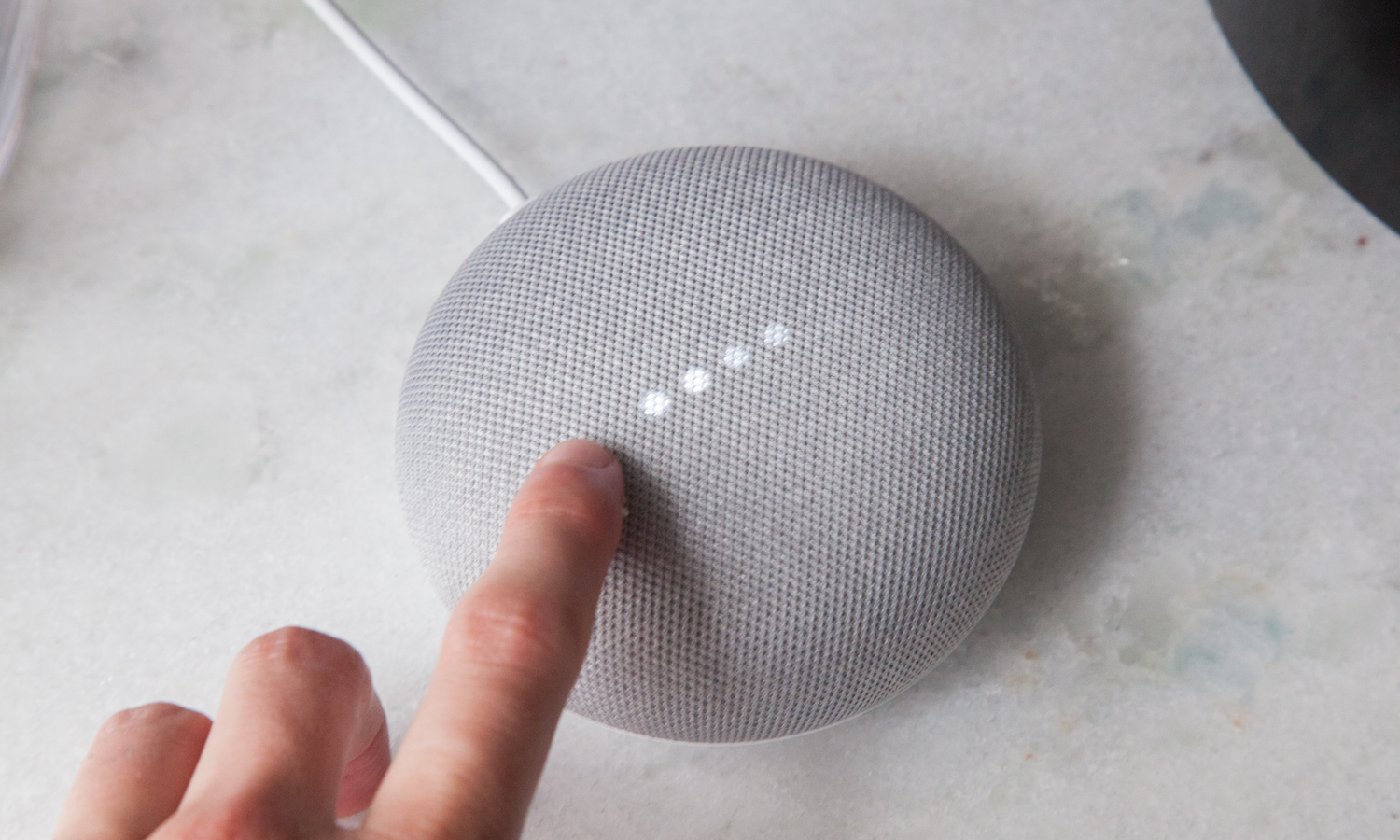
By comparison, the Home Mini turned out louder, richer and fuller sound. While this device won't replace a larger speaker, it would be just fine if you wanted some background music in your bedroom when you're going to sleep or waking up.
Winner: Home Mini. Its speaker sounds miles better than the Dot's.
Get instant access to breaking news, the hottest reviews, great deals and helpful tips.
Smart Home Features
Google and Amazon are positioning their devices to act as a means to control smart home gadgets, from lights to locks to thermostats. However, Amazon is much further along in this regard; Amazon's smart home page lists nearly 600 devices that will work with Alexa.

By comparison, while Google Home is compatible with an equally wide range of product types, they represent far fewer companies, at about 50.
Winner: Echo Dot. While it's no fault of the Home Mini's hardware, Amazon's service works with far more smart home devices.
Voice Assistant
We've done a few head-to-head competitions between Amazon Alexa and Google Assistant (check out our 300-question showdown), so we'll just hit the highlights here.
Both Alexa and Google Assistant let you call any number in the U.S. and Canada, a very helpful feature.
The two devices can both recognize individual voices, and provide information tailored to that person, such as their schedule or the time it'll take to commute to work. However, Google Assistant can translate speech into different languages.
MORE: Amazon Alexa Guide: Tips, Tricks, and How-Tos
However, after that, Alexa is capable of far more, as a result of Amazon opening up its API so that third parties can create Alexa skills to augment the assistant's abilities. There are now more than 24,000 skills, spanning the gamut from humor to productivity to games to fitness. To help you sort through them all, we've cultivated a list of our 50 favorite Alexa skills.
While both can deliver briefings of the day's news, weather and sports scores, only Alexa lets you specify favorite teams and order things off of Amazon (natch).
Winner: Echo Dot.Alexa can do far more than Google Assistant.
Music and Movie Playback
Both Google and Amazon support Spotify, Pandora, iHeartRadio and TuneIn. Amazon has Amazon Music, while Google has Google Play Music and YouTube Music. However, only Amazon lists support for Sirius XM.
The Echo Dot's speaker may be horrible, but Amazon has attempted to ameliorate the situation by letting you pair the Dot via Bluetooth with a second speaker, or by using its 3.5mm audio jack.
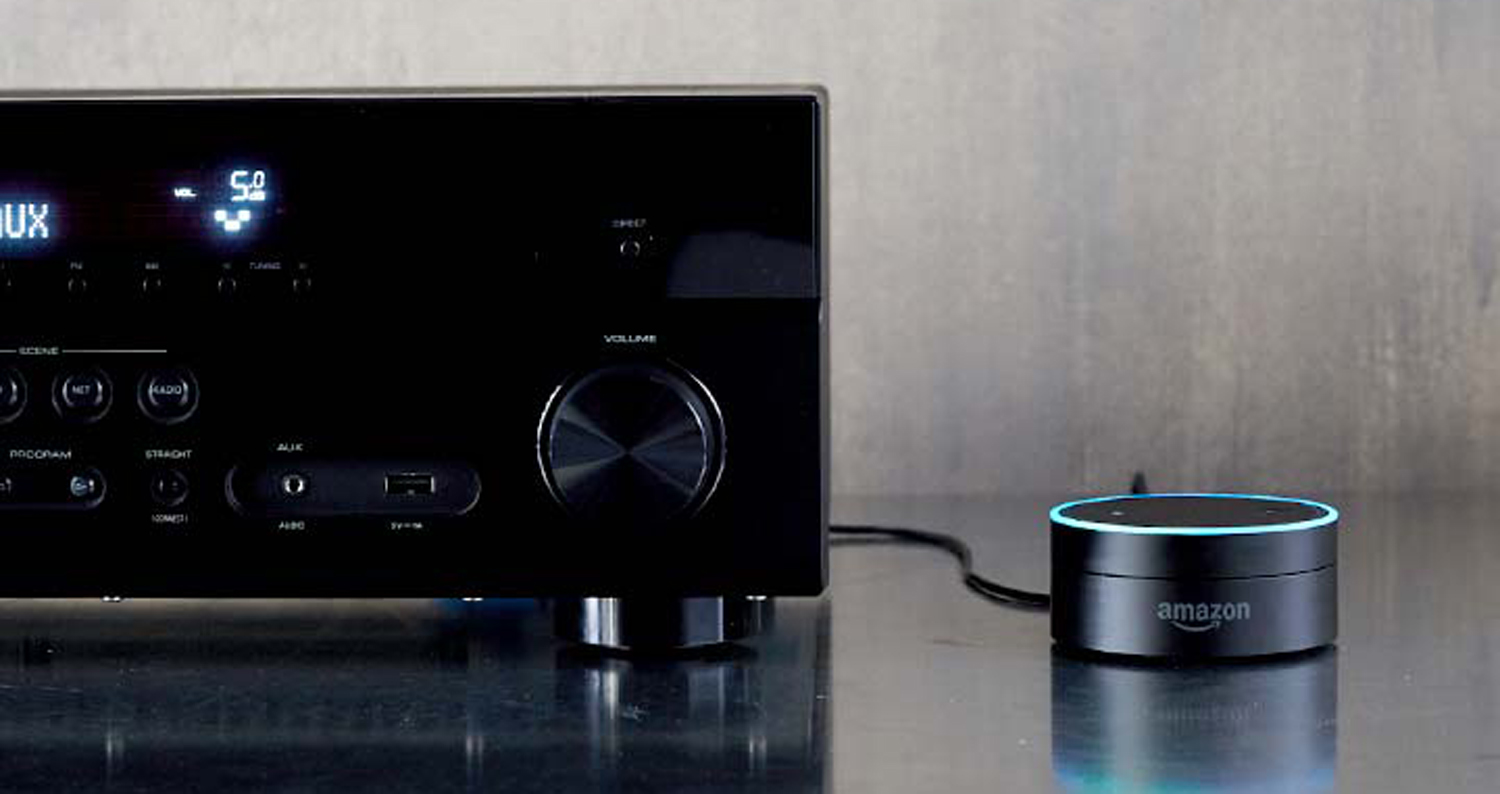
The Home Mini has neither of these capabilities, so you can't pair it with other speakers. However, it can be used to stream both music and video to Chromecast-enabled devices, as well as TVs running the Android TV platform. So, you could say, "OK, Google, play YouTube," and that service will pop up on your TV.
Winner: Home Mini. Although it lacks the ability to pair or connect to a Bluetooth speaker, the Mini's integration with Chromecast and Android TV devices gives it the edge.
Microphone
To test the microphones on the Home Mini and the Echo Dot, I placed them about 15 feet away from me. With no music playing from either device, I could talk in a library-quiet voice, and both devices were able to hear and understand me.
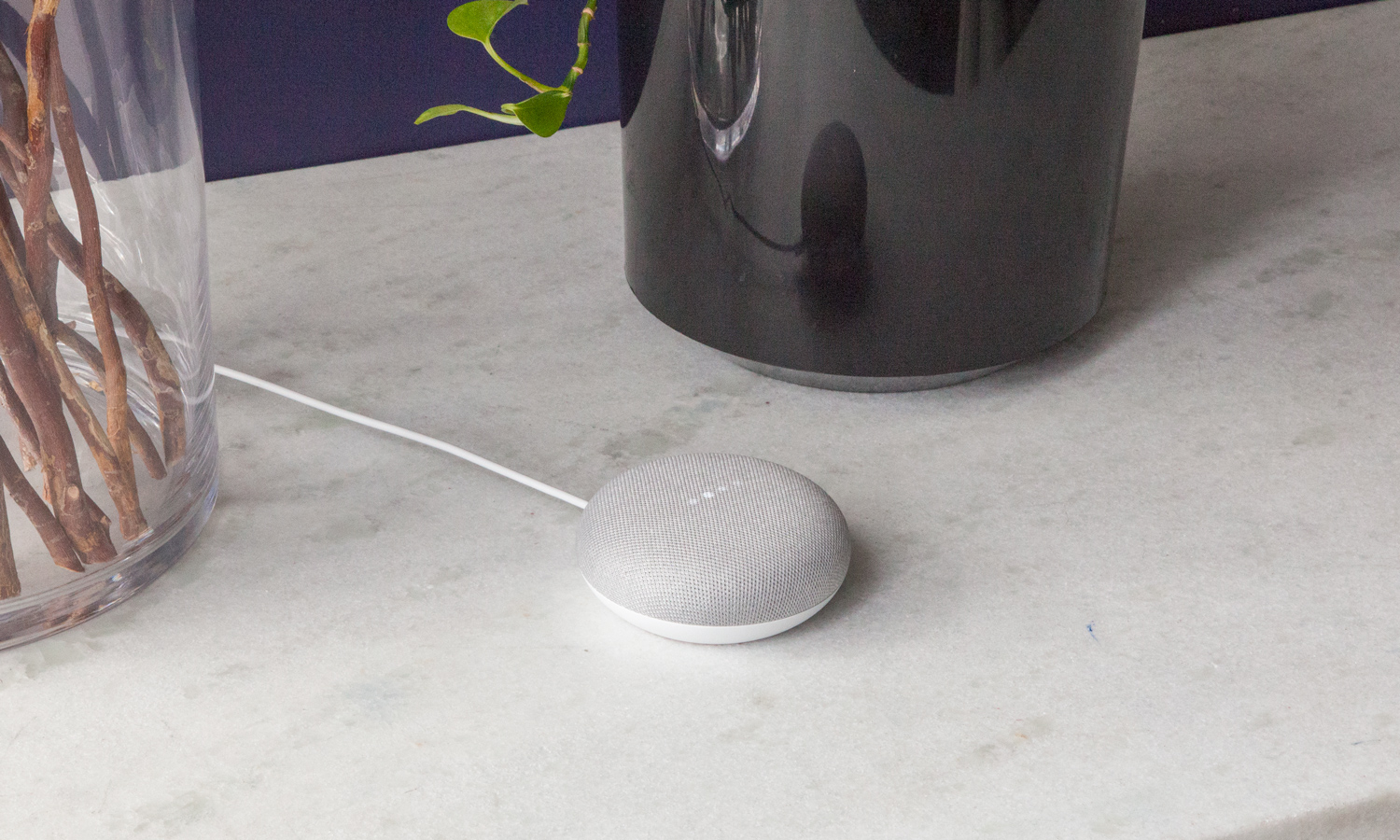
I then played music through each speaker one at a time, and again tested their sensitivity. This time, I had to raise my voice to slightly more than a normal speaking volume in order to be heard.
Winner: Draw. Both performed well, and while I had to raise my voice while music was playing from each speaker, it wasn't unreasonable.
Price and Value
The list price for both the Echo Dot and the Home Mini is $49. However, Amazon is currently discounting the Echo Dot for $45 and often offers other deals for its mini speaker, such as bundling it with other smart home devices.
Winner: Echo Dot. It's $5 less than the Home Mini, and Amazon offers more deals.
Bottom Line
| Amazon Echo Dot | Google Home Mini | |
| Design | X | |
| Audio Quality | X | |
| Smart Home Features | X | |
| Voice Assistant | X | |
| Microphone | X | X |
| Music and Movie Playback | X | |
| Price and Value | X | |
| Total | 5 | 3 |
Amazon's Echo Dot may not look like much, but it's got it where it counts. While its speaker is weak, you can pair it easily with better speakers. Most importantly, Alexa can do far more than Google Assistant can, and the Dot is Amazon's least expensive method for getting Alexa into your home.
Credit: Shaun Lucas/Tom's Guide, Amazon
- Best Smart Home Hub
- Our Favorite Smart Home Gadgets and Systems
- Smart Home Guide: What to Know Before You Buy
The Editor's Choice Echo Input adds Alexa functionality to your standalone speaker via a 3.5mm cable or Bluetooth. For Prime members only, it's $20 off and the cheapest it's ever been.

Michael A. Prospero is the U.S. Editor-in-Chief for Tom’s Guide. He oversees all evergreen content and oversees the Homes, Smart Home, and Fitness/Wearables categories for the site. In his spare time, he also tests out the latest drones, electric scooters, and smart home gadgets, such as video doorbells. Before his tenure at Tom's Guide, he was the Reviews Editor for Laptop Magazine, a reporter at Fast Company, the Times of Trenton, and, many eons back, an intern at George magazine. He received his undergraduate degree from Boston College, where he worked on the campus newspaper The Heights, and then attended the Columbia University school of Journalism. When he’s not testing out the latest running watch, electric scooter, or skiing or training for a marathon, he’s probably using the latest sous vide machine, smoker, or pizza oven, to the delight — or chagrin — of his family.
-
d5115r Google Home *does* allow Bluetooth audio streaming and playback, but it must be enabled in the Home app's settings first.Reply -
jacksmith21006 This is a pretty whacked review. In the end these devices are about their assistants, I purchased and Echo late in 2014 and now have several Google Homes.Reply
The two assistants are not comparable. You memorize and use commands with Alexa and the Google Home you just speak naturally. This makes all the difference in the world and foundational to everything on top.
But then obviously the Google Home has access to much more information than Alexa.
So in the end everything else takes a back seat as how you interact with it is voice.
But do have to say if you think the design of the Dot is better than the Google Mini then I would like to have what you are smoking. I would say that it might be just a difference in opinion but that would require it being close. -
compubyte2010 WOW .. whoever wrote this article isn't Bias at all.. and it doesn't show at all throughout this article (he says sarcastically)Reply
Seriously? because RIGHT NOW. amazon has $5 off it WINS.. just we can get another POINT / SCORE for the echo?? Oh wait.. Google has a discount now for $19+ Off . so do they win that one?
and Oh come on! seriously? THe Hockey puck design Wins .. 1st off you don't ever have to touch google Home or mini to turn the volume up or down. just tell it to turn the volume up or down.
and well. others have already mentioned some other things. but seriously 4 buttons to adjust volume works design wise better than just touching the left or right side? so if they Dumbed it down for you, and put marks on the left and right for volume, you'd be ok with that? Is there anything else we can do to dumb things down in the world for you? -
tvjake2 Another article asked each unit to answer the same 45 questions. Dot 18/45, Mini 25/45. Guess who won....Reply
